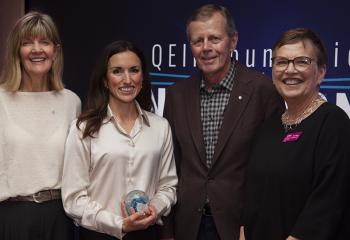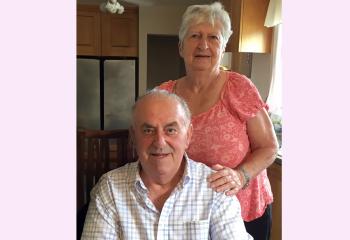
Pictured: Dr. Robin Urquhart, the Atlantic Cancer Consortium’s co-lead and principal investigator, an affiliate scientist with Nova Scotia Health and an associate professor at Dalhousie University.
With nearly half of all Canadians expected to face a cancer diagnosis in their lifetime, the need for transformative cancer care is at an all-time high. That’s why the QEII Foundation has joined forces with the Terry Fox Research Institute on a groundbreaking project called the Marathon of Hope Cancer Centres Network.
QEII Foundation donors generously contributed $250,000 as part of our We Are campaign to help advance this collaboration through the Atlantic Cancer Consortium, which has recently joined the Marathon of Hope.
The Marathon of Hope is a nationwide endeavor, focused on precision medicine in cancer care. The initiative includes over 30 hospitals and research institutions across Canada – combining the advanced knowledge and resources of cancer experts to transform cancer care for all Canadians.
This $1-billion Canadian-wide research effort aims to improve cancer diagnoses, better predict how different patients will respond to treatments, and deliver more personalized and effective treatments with fewer side effects.
Dr. Robin Urquhart, co-lead and Nova Scotia principal investigator of the Atlantic Cancer Consortium and cancer researcher affiliated scientist with the QEII, offers first-hand insight into the tangible impact the Marathon of Hope will have for patients in Atlantic Canada and beyond.
Precision medicine: delivering research-based care
The ultimate goal of the Marathon of Hope is to close the gap between research in the lab and patient care – with a focus on precision medicine.
“Cancer is not one disease,” says Dr. Urquhart. “For example, one person’s breast cancer is very different from another person’s. That is based on what we call a molecular profile.”
Because of the differences in the molecular cancer profile, each patient requires a customized approach to cancer treatment.
With the expansive network of hospitals and research institutions included in the Marathon of Hope, researchers involved in the project will be able to collect a significant amount of patient data regarding the best types of cancer treatment depending on different types of cancers.
“We’re bringing together researchers and physicians from across the country to compile the most comprehensive cancer resource in Canada, made up of all kinds of data from patients across the country,” says Dr. Urquhart.
“Data will allow us to figure out why certain patients respond to treatments really well and other patients don't.”
Eventually, using the data collected, it will be a goal to match each new cancer patient to the best treatment possible based on their specific molecular profile of cancer.
With more personalized treatments comes better patient response, fewer side effects and many other benefits waiting to be uncovered by research, such as possible markers that could allow for earlier detection.
“We’re using science to get the right person the right treatment at the right time,” she explains.
Accessible cancer care: ensuring timely, targeted treatment
Nova Scotia has some of the highest cancer rates in Canada. Unfortunately, our province also has some of the lowest cancer survival rates, making this research incredibly important for current and future patients.
Over the next three years, the Atlantic Cancer Consortium will generate more than $24 million in funding – through the Marathon of Hope – to conduct and accelerate precision cancer research in our region.
Atlantic Canadian researchers are beginning to examine the high incidence of cancer in our region and are exploring ways to improve cancer detection, diagnosis, treatment, and prevention.
Under Dr. Urquhart’s leadership, the Atlantic region will also investigate ways to deliver precision medicine to cancer patients in rural and underserved areas, ensuring they have timely access to critical cancer treatments.
Dr. Urquhart has first-hand experience with the struggles of accessing cancer treatment in rural areas and has a deep passion for ensuring equitable care.
When she was 11 years old, her father passed away of pancreatic cancer at age 38. To receive treatment, he had to drive seven hours from their home in rural Newfoundland to the hospital in St. John’s. Three and a half years later, her mother died of the same kind of cancer at age 35.
“Growing up in a rural part of our country, I’ve experienced that access to cancer care can be very hard,” says Dr. Urquhart.
“Part of the goal of this initiative being that every single Canadian, regardless of where they live, will have access to the best possible treatment for their cancer.”
We're truly grateful to our QEII Foundation donors for propelling the Marathon of Hope Cancer Centres Network and the Atlantic Cancer Consortium toward advancing precision medicine. Your generosity will help close the gap between research and cancer care for more personalized, accessible cancer treatments.
“It’s been just wonderful to work with the QEII Foundation to help us get this started here in Atlantic Canada and Nova Scotia,” Dr. Urquhart expresses.
“Through donor funding, it’s built the ability for us to take part in this huge, Canadian-wide effort.”
Dr. Urquhart also serves as the Canadian Cancer Society Nova Scotia Division Endowed Chair in Population Cancer Research at the QEII Health Sciences Centre – a critical position funded in perpetuity by QEII Foundation donors.


